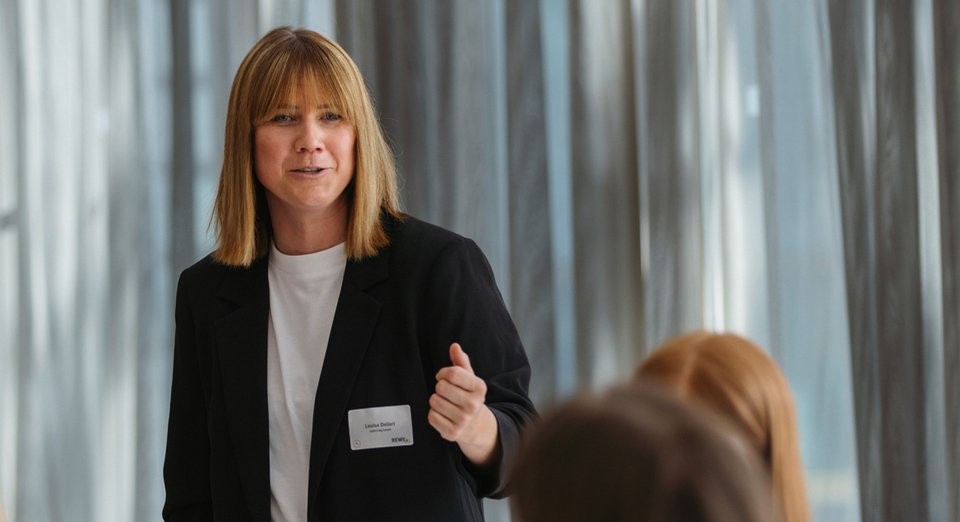
Entrepreneur, presenter, author - Louisa Dellert is all of these things. The Berlin native started out on social media nine years ago and is now one of the best-known sustainability influencers. In this interview, she explains how retailers could make sustainable consumption easier for customers, why she advocates dialogue between companies and consumers - and what has given her the impetus for a more sustainable lifestyle.
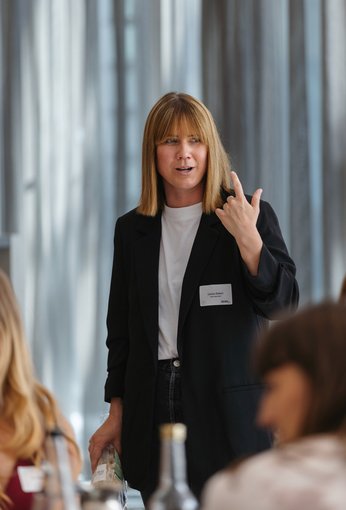 Louisa Dellert
one: Louisa, you became known many years ago as a fitness influencer. Today, you are committed to greater Sustainability and environmental protection, among other things. What was the impetus for this?
Louisa Dellert
one: Louisa, you became known many years ago as a fitness influencer. Today, you are committed to greater Sustainability and environmental protection, among other things. What was the impetus for this?
Louisa Dellert : It was on holiday in Malta a few years ago. I wanted to take an underwater picture for Instagram. There was rubbish floating all around me, white plastic bags, straws and plastic lids. I was really annoyed that this rubbish was in the picture. At that moment, I didn't even ask myself how it actually got into the sea and didn't clear it away. It was only when I looked at the pictures again in the hotel that the thought occurred to me: if there was a bag floating around in my father's garden pond, I would have taken it out. Why not now? Because it's the open sea and I feel like it doesn't belong to me? This experience was the trigger that made me realise: I want to live more sustainably. And the development of Fridays for Future and everything that followed has reinforced this realisation.
one: Today you are many steps further and advise companies, among others. At the REWE Group dialogue forum in April, you worked with customers and followers to develop specific sustainability measures for REWE and PENNY and presented them to the managing directors. How did you find the dialogue?
Louisa Dellert: It was really interesting to see what wishes and demands were expressed by the participants. And I thought it was great to see how open everyone involved was to the other perspectives. At the same time, there was an aha moment when I realised that many of the participants didn't know what REWE Group was doing in terms of Sustainability. Perhaps more thought needs to be given to alternative ways of reaching this target group with a greater affinity for sustainability.
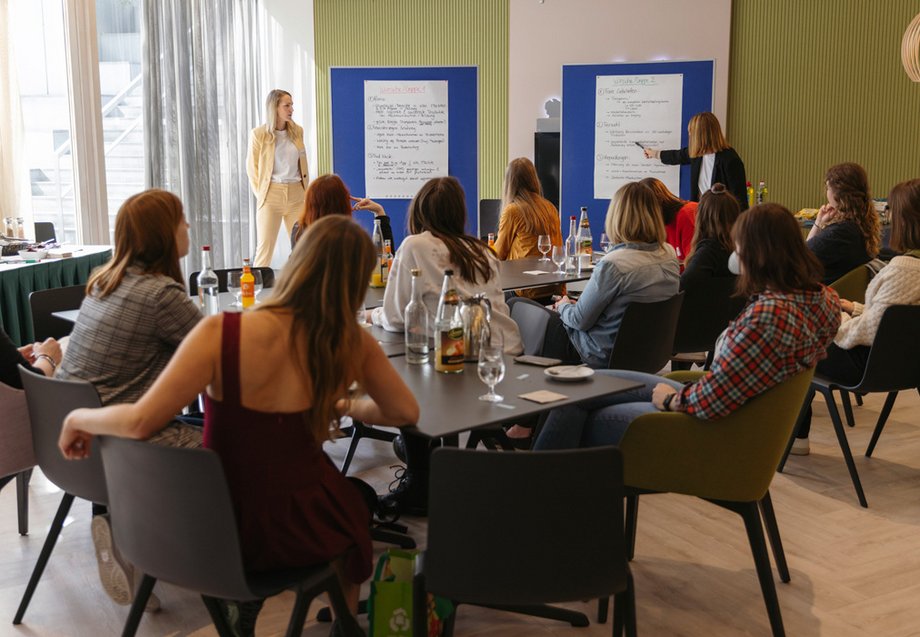 What do customers want from REWE and PENNY when it comes to Sustainability? Louisa Dellert developed joint ideas in a workshop at the REWE Group dialogue forum.
What do customers want from REWE and PENNY when it comes to Sustainability? Louisa Dellert developed joint ideas in a workshop at the REWE Group dialogue forum.
„I always say: we have to talk to each other and not about each other.“

one: The ideas and measures developed at the dialogue forum range from reducing food waste to a fair supply chain. Which ones have stuck in your mind in particular?
Louisa Dellert : I think the approach of working even more with start-ups or small companies is good and important. For example, on the topic of food waste, which was close to many people's hearts and there were some ideas for tackling the topic from an alternative angle.
I also thought the idea for a jute bag deposit system was great. It really appealed to me, because I sometimes realise when I'm shopping that I've forgotten my jute bag, but I already have what feels like dozens at home and don't really want to buy a new one or a paper bag.
And I personally also like the approach of working with product placement: Fairer, more transparently produced products should be given better placement on the shelf so that customers are more likely to come into contact with them. This might also incentivise manufacturers who have not yet produced so sustainably if they know that they are doing so: Then I'll end up at the bottom of the shelf if I'm not sustainable at all.
one: What do you think the benefits of such an exchange between companies and customers are?
Louisa Dellert : An exchange is super important for companies, because at some point you simply become blind to the business. I don't mean that in a negative way, but the fact is that you think within your own structures and I think it's very helpful to get input from outside and be challenged from time to time. I always say: we need to talk to each other and not about each other. For example, if your customers understand why you can't discontinue a product or change the packaging overnight, you can discuss these topics in a completely different way and find other solutions. I think it's important that everyone involved feels that their opinion is really being taken seriously and that the issues are being addressed.
„Sustainability shopping should be even easier in practice and should not require so much organisation from people.“

one: In surveys, a majority of respondents often state that they want to consume more sustainably. However, when they go to the supermarket, many of them go back to conventional peppers or sausages from factory farming. What do you think supermarkets and discounters can do to make sustainable consumption easier?
Louisa Dellert: I think that supermarkets also have an educational mission. After all, I am in constant contact with my supermarket in my everyday life, where I buy what I need for my daily life. At the same time, we all live in different realities and already have enough to do with our everyday lives. It's not right that I have to spend ten minutes scrutinising every product in the supermarket and studying the small print just to decide: Is this the right thing I'm buying? Or do I have to have a guilty conscience? Supermarkets could do more to help customers make better purchasing decisions. I also think that sustainable shopping should be even easier in practice and shouldn't require so much organisation from people.
one: What could that look like in concrete terms?
Louisa Dellert : It's great when you give people the opportunity to do something for the environment when shopping - for example by offering reusable bread bags or reusable cups. But many people don't always have these things with them or don't even have them at home and have to buy them first. And we mustn't forget that there are enough households that have to turn over every euro at the end of the month. That's why I would like to see more systematisation on the part of supermarkets and discounters, for example deposit systems: If I don't have a bag with me, I borrow one and then bring it back. Sustainability must be made as easy as possible for customers so that as many people as possible join in.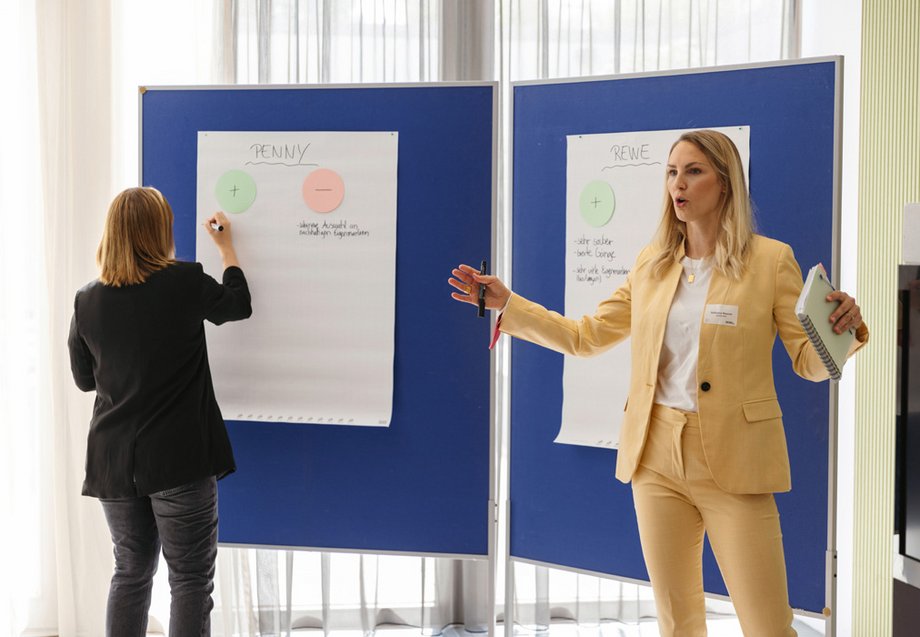 What is already going well, where should REWE and PENNY improve in terms of Sustainability? Louisa Dellert (left) collected the participants' ideas.
What is already going well, where should REWE and PENNY improve in terms of Sustainability? Louisa Dellert (left) collected the participants' ideas.
one: In retail, you often hear the opposite argument: demand determines supply. So if more people buy more sustainable products, they will also be more available.
Louisa Dellert: I find that really difficult. On the one hand, it makes it easy for people, but on the other hand, we are currently in a phase of social upheaval in which more and more people are realising that we need to consume more sustainably, eat less meat and pay attention to fair supply chains. But then, for example, fairly produced chocolate is a little more expensive and a family of four that really has to watch its money can't easily afford it. At the same time, companies are also competing on price. I don't have a solution to this dilemma. But I think the responsibility lies on the consumer side, especially with those who live a more privileged life. To be honest, I can afford fair chocolate or a vegan substitute product that costs more. That doesn't hurt me. And perhaps this is the beginning of more privileged people, who presumably have a larger carbon footprint anyway, seeing themselves as more responsible. At the same time, more new concepts and ideas are needed so that climate-neutral and fairly produced products don't break the bank and more sustainable consumption remains affordable. We can't have a situation where a kilo of minced meat costs less than a meat substitute.
one: So both retailers and consumers need to make a move. Where do you see the role of politics?
Louisa Dellert : Politicians must ensure minimum standards, of course. Our entire capitalist system is basically not conducive to fair production and transparent supply chains. But we're all part of capitalism, we're not going to change that any time soon. Abolishing capitalism - I think that's a great but utopian idea and as long as that doesn't happen, we need to invest energy and time and look at how we can work more sustainably within the system that exploits many people. We need to create more fairness and transparency, and this is certainly a matter for politicians. But companies also need to make a greater moral commitment, otherwise future generations will suffer greatly. Companies can play a pioneering role here.
one: You are now trying to consume as sustainably as possible yourself. Has the changeover been easy for you?
Louisa Dellert: No, the desire to only consume sustainably put me under a lot of pressure at first. I was often overwhelmed and frustrated. After the holiday I mentioned at the beginning, for example, I said: I don't want to produce any more packaging waste from now on. I saw that one blogger only manages to produce one jar of rubbish a year. For me, that was already full with the packaging from the toilet paper!
„But I think the responsibility lies on the consumer side, especially with those who live a more privileged life.“

one: How did you deal with this?
Louisa Dellert : Over the years, I've realised time and again that I don't manage to implement my aspirations in my everyday life. Going to the weekly market with cloth bags here, to the unpackaged shop with containers there - it takes a lot of time to consume one hundred per cent sustainably. And having this time is also a privilege. And that brings me back to the supermarkets: you have the leverage to make sustainable consumption easier for many people so that they can implement it in their everyday lives.
one: How has your lifestyle changed since you started paying more attention to Sustainability?
Louisa Dellert : I think differently and have a better understanding of how things are connected. I've become more mindful and question three times when I buy something whether I need it and how it was produced. At the same time, I don't want to do without everything, for example when travelling. I used to fly four times a year. Today I still fly, just because I have friends and family abroad - but much less. I want to be transparent about this, because I think that's the dilemma we all face: living consciously and responsibly while still wanting to fulfil our own needs.
one: In the digital world, people are quick to denounce you if you don't (yet) live or do business one hundred per cent sustainably - this applies to companies, but also to public figures, as in your case. How do you deal with criticism?
Louisa Dellert : There will always be criticism, and of course some constructive criticism is justified. But you have to start somewhere. I don't have a solution for that. I can be accused of double standards or of not living sustainably after all. But then I think to myself: before I judge and condemn others, it's better to take a step back and ask myself: what am I doing for the planet? How am I contributing? Because we are all challenged to start with ourselves.
one: Which sustainable product would you like to see on the shelves?
Louisa Dellert: Grainy cream cheese in vegan. At least I haven't found that yet, and you could make me very happy with that.
Louisa Dellert, born in Wolfenbüttel in 1989, is an influencer, entrepreneur, presenter and author. For many years, she has been exchanging ideas on social media with
She talks to people about everything that moves her: be it environmental protection, equal rights or politics. She reaches almost 470,000 people on Instagram with her topics.

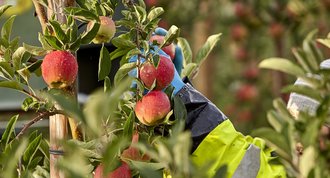
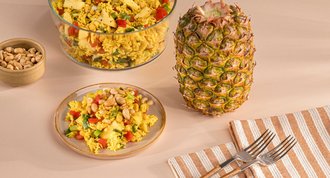
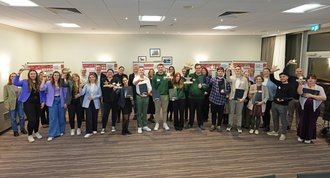

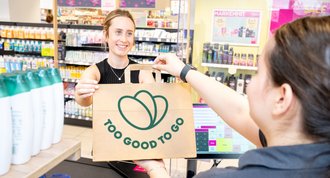
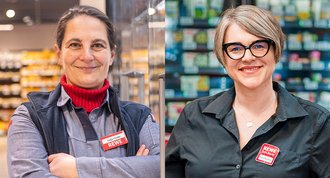
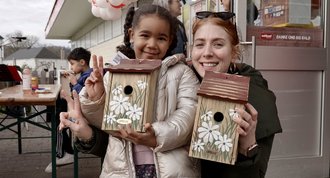
Both German and English comments appear here.
I recently saw a private label at my favourite grocer's that made me shake my head and doubt whether it would all end well ... plastic tableware, which has actually been banned across the EU, a bit expensive and, very importantly, labelled MEHRWEG...tststs